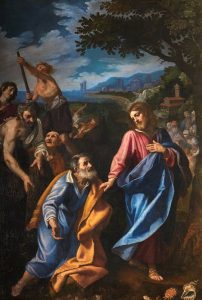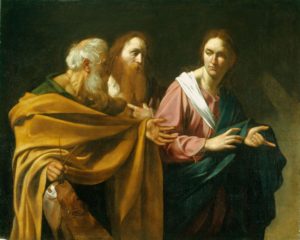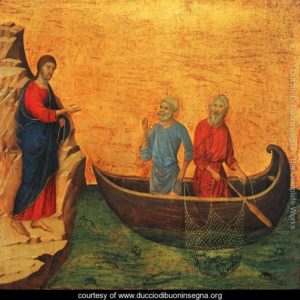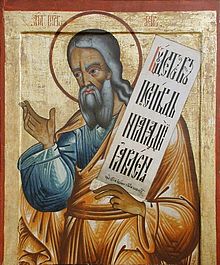Illuminations on the Lectionary readings for Jan. 15, 2023 (Epiphany 2A)
First Reading: Isaiah 49:1-7
On the second Sunday after the Epiphany, the Gospel appointed for the day offers us another perspective on the baptism of Jesus, a very different approach from the Gospel according to Matthew that we heard last week.

The Calling of Saints Peter and Andrew (1607)m , oil painting on canvas by Ludovico Cardi, known as Cigoli (1559-1613). Palatine Gallery, Uffizi Galleries, Florence, Italy. (Click image to enlarge)
Before we get to the Gospel, though, the first three readings present other approaches to the notion of waiting for God with faith and hope. Our first reading gives us another of Isaiah’s four visions of the Suffering Servant, a figure that the prophet understood as God’s savior coming to lead the the people back to Jerusalem from their Babylonian exile. This once despised figure, the prophet foretells, will rise up and extends God’s saving power to all the nations, to the ends of the Earth.
Psalm: Psalm 40:1-12
Like the people in Isaiah’s time who waited in exile for their servant savior, the Psalmist waits with patience and faith for God to act. Although surrounded by too many evils to count and blinded by iniquities until his heart fails, the Psalmist remains firm in the hope that God’s faithful, steadfast love will eventually bring mercy, deliverance and safety. We mustn’t trust in evil spirits or false gods, the Psalmist reminds us, but find our joy in trusting God, against whom none other can be compared. God requires no sacrifices or burnt offerings, but responds to our faith with compassion and love.
Second Reading: 1 Corinthians 1:1-9
Paul sets the tone for his first letter to the church at Corinth in these introductory verses, a friendly greeting that offers insight into all that follows. The congregation in Corinth was a small and troubled community, divided into quarreling factions, each with its own ideas about Christian practice and which leader to follow. Paul begins by reminding them that they are joined with all Christians who call on the name of Jesus as Lord. Through this faith they have already received gifts that have made them strong, Paul says. He urges them to hold on to those gifts and be steadfast as they wait for Christ’s coming, an event that many in those days hoped would happen within their lifetimes.
Gospel: John 1:29-42
Last week in Matthew’s account of the baptism of Jesus, we heard John the Baptist ask why Jesus shouldn’t be baptizing him rather than the other way around. Now in John’s gospel we hear another approach to this sticky question: Why would a sin-free Jesus need to be baptized for the forgiveness of sins at all? The answer comes not from Jesus but from John: He has been baptizing others in hope that the Lamb of God would be revealed. Now he has seen the Spirit descending from heaven like a dove and remaining on Jesus, showing that this is the Son of God. Then the first disciples, seeing all this, recognize Jesus as the Messiah and start to follow him.



